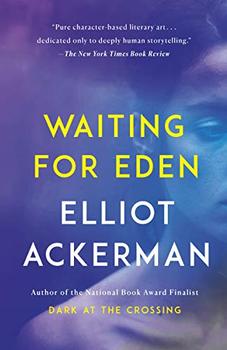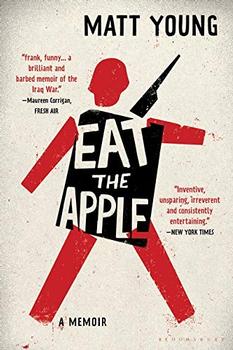Summary | Excerpt | Reviews | Beyond the book | Read-Alikes | Genres & Themes | Author Bio

A Story of War and the Life That Follows
by Brian Castner Brian Castner graduated from Marquette University with an Engineering degree in 1999 and promptly joined the Air Force. He was placed in what he refers to as the "step-child of Air Force civil engineering: Disaster Preparedness," but found he had little interest in or talent for the assignment. One day, several months after 9/11, he was invited to a mystery meeting which turned out to be on dismantling a bomb. "I sat in silent rapture," he writes. "Now I knew what I wanted to be when I grew up, and I would make the Air Force let me do it." And with that he began a journey that would impact, and continues to impact, every aspect of his life. He went on to serve three tours of duty in the Middle East, two as the commander of an Explosive Ordnance Disposal (EOD) unit in Iraq. The Long Walk: A Story of War and the Life That Follows is Castner's account of his harrowing military career and his struggle to adjust to civilian life after his discharge.
Brian Castner graduated from Marquette University with an Engineering degree in 1999 and promptly joined the Air Force. He was placed in what he refers to as the "step-child of Air Force civil engineering: Disaster Preparedness," but found he had little interest in or talent for the assignment. One day, several months after 9/11, he was invited to a mystery meeting which turned out to be on dismantling a bomb. "I sat in silent rapture," he writes. "Now I knew what I wanted to be when I grew up, and I would make the Air Force let me do it." And with that he began a journey that would impact, and continues to impact, every aspect of his life. He went on to serve three tours of duty in the Middle East, two as the commander of an Explosive Ordnance Disposal (EOD) unit in Iraq. The Long Walk: A Story of War and the Life That Follows is Castner's account of his harrowing military career and his struggle to adjust to civilian life after his discharge.
Castner experienced brain damage from the repeated blast waves he endured which subtly tore his brain's nerve endings. This type of injury is increasingly common among returning soldiers and can be difficult to diagnose. Those affected react differently, depending on the area of the brain that has been damaged; Castner refers to his symptoms as "The Crazy": an unrelenting and intolerable sense of stress and tension he's experienced since returning from Iraq in September, 2007. He relates the day he snapped:
"Months pass, but then you have that day. Everyone has a day. My day was walking with my aunt through the Pearl District on the west side of Portland, Oregon. I stepped off the curb normal. When my right foot hit the pavement I was Crazy.
That odd combination of twinges, the unspecific aches, the random symptoms that sent you to the doctor over the years, suddenly combine in one overwhelming explosion. My chest flooded with emotional helium. It filled with an oppressive, overpowering distraction that pushed every rational thought from my head. Arm to arm, shoulder to shoulder, gut to neck, I blew up like a balloon. Not with pain, but with unnamable discomfort, a feeling - what feeling? - that demanded attention."
He goes on to describe the devastation The Crazy continually wreaks on his life. He'll see an individual in an airport, become convinced that person is a terrorist, and will then go on to fantasize how many people he'd have to kill - which specific individuals and in what order - to get to the perceived threat. He thinks about how best to conceal a gun in his car to protect his family and spends nights at the top of the stairs, rifle in hand, to keep his four children safe. He cries at odd times; even helping his son into his hockey uniform can reduce him to tears since it's so similar to the bomb suit the technicians wear for the "Long Walk" (the bomb disposal option of last resort, when remotely controlled robots have failed and an individual must go out alone to defuse a bomb by hand).
Castner vividly captures his emotional pain and confusion in prose that sometimes borders on the poetic; his style is unpolished and raw, yet surprisingly affective.
"I died in Iraq. The old me left for Iraq and never came home. The man my wife married never came home. The father of my oldest three children never came home. If I didn't die, I don't know what else to call it.
I liked the old me, the one who played guitar, and laughed at dumb movies, and loved to read for days on end. That me died from a thousand blasts, died covered in children's blood, died staring down my rifle barrel the first time I put a helpless woman in the crosshairs and my finger on the trigger. That me is gone.
The new me is frantic and can't sit still. The new me didn't laugh for a year. The new me cries while reading bedtime stories to my children. The new me plans to die tomorrow. The new me runs almost every day, runs til knees buckle and fail. The new me takes his rifle everywhere. The new me is on fast forward. The new me is Crazy."
One criticism I've read of The Long Walk is that it can be difficult to tell whether what's on the page reflects the past, present, or something only occurring in Castner's mind, as he flows seamlessly from one event to the next. Personally, I found this added to the authenticity of this memoir, allowing me to better experience the way his mind works - his memory casting him back to Iraq with no warning or knowledge of what might trigger the flashback. When talking about his experiences in Iraq he's surprisingly candid about his actions and reactions. He is unsparingly matter-of-fact when describing events that continue to haunt him, such as ordering a soldier to kill an Iraqi thought to be a bomber, wanting to open fire on a group of women to make them stop screaming, and finding a dismembered foot in a cardboard box which caused him to break down in hysterical laughter. One truly gets a feel for the pressure he and his team were under as they scouted for bombs, disabled IEDs, and - worst of all - performed forensics when they arrived after a detonation. These sections are more straightforward and less self-analytical, although they still vividly convey the horror and confusion he and others experienced day after day.
"The Iraqi Police who arrived before us made no pretense of holding back the crowds, swelled and frantic, pouring over the scene, collecting pieces of loved ones and already mourning the dead. What evidence could we possibly find in the chaos? My frustration grew as the shell of the suicide bomber's car was loaded on a tow truck bed before we had a chance to examine it. Iraqi Policemen brought us arms and hands, gesturing and talking hysterically, but with no Terp around we understood little. The colonel himself had already left, to the main police station to plan a reprisal against the Arab faction that produced the suicide bombers. And through it all, the women never stopped screaming, never stopped chanting, never stopped their piercing clamor."
The Long Walk is a scathingly honest portrayal of the stress of war, the depth of loss soldiers experience and the immense challenges many of our returning veterans face every day. It should be required reading for anyone considering a military career, and is a must-read for those seeking to better understand the ultimate costs of war paid by the men and women who wage it for us (and by the families who stand beside them). It's sure to become a classic of wartime literature.
![]() This review was originally published in The BookBrowse Review in August 2012, and has been updated for the
April 2013 edition.
Click here to go to this issue.
This review was originally published in The BookBrowse Review in August 2012, and has been updated for the
April 2013 edition.
Click here to go to this issue.

If you liked The Long Walk, try these:

by Elliot Ackerman
Published 2019
From the National Book Award finalist, a breathtakingly spare and shattering new novel that traces the intersection of three star-crossed lives.

by Matt Young
Published 2019
"The Iliad of the Iraq war" (Tim Weiner) - a gut-wrenching, beautiful memoir of the consequences of war on the psyche of a young man.
Your guide toexceptional books
BookBrowse seeks out and recommends the best in contemporary fiction and nonfiction—books that not only engage and entertain but also deepen our understanding of ourselves and the world around us.